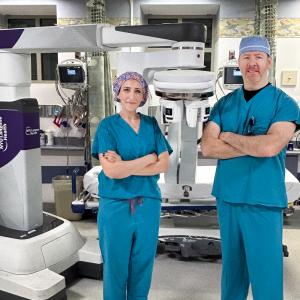
Five years after a prostate cancer diagnosis, Stuart Ohleyer is now cancer-free.
Courtesy of Stuart Ohleyer
Stuart Ohleyer, a Brooklyn resident, went to the doctor for routine blood work. When his results showed that he may have prostate cancer, Ohleyer knew he needed to see a specialist to learn more.
Ohleyer was familiar with NYU Langone Health because his daughter was born there, and after doing some research, he made an appointment with Herbert Lepor, MD, the Martin Spatz Chair of Urology at the Department of Urology.
After meeting with Dr. Lepor at Perlmutter Cancer Center, Ohleyer was screened and diagnosed with early-stage prostate cancer. The two discussed treatment options and determined that Ohleyer was a good candidate for focal therapy. This new treatment for prostate cancer, also known as focal ablation or partial-gland ablation, uses radiofrequency, high-intensity, focused ultrasound (HIFU), or cryotherapy (extremely cold temperatures) to destroy some or all of the prostate, eliminating the cancer.
Doctors at Perlmutter Cancer Center pioneered this treatment, and the team has been studying the long-term effects and efficacy of focal therapy for prostate cancer treatment. They presented findings at the American Urology Association annual meeting earlier this year: the study showed that focal therapy was successful for 91 percent of patients.
Focal therapy is a less invasive option and has a lower risk for side effects than other treatments, such as a radical prostatectomy (also known as whole-gland ablation) or radiation therapy. Focal therapy helps preserve erectile and urinary functions, enabling patients to maintain their quality of life. After reviewing his options with his doctor, Ohleyer decided that focal therapy was his preferred course of treatment.
After the procedure, Ohleyer was able to go home the same day. He had a fast recovery and no long-term side effects. He has had regular follow-ups with Dr. Lepor over the years to remain vigilant, but is now considered cancer-free.
“We know, after years of research and hundreds of procedures, that this treatment is effective,” says Dr. Lepor. “We can offer our patients the best outcomes, not just by treating their cancer, but also reducing the burden of treatment.”
Now that focal therapy is more established and widely used for prostate cancer treatment, it is important that men receiving care know that this option is available.

